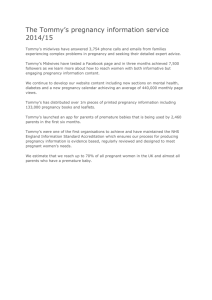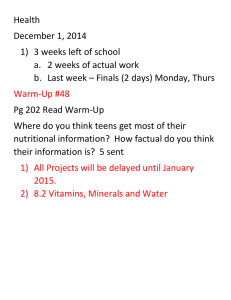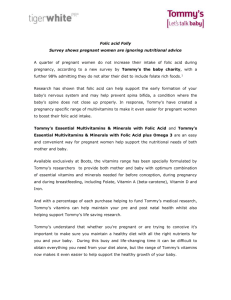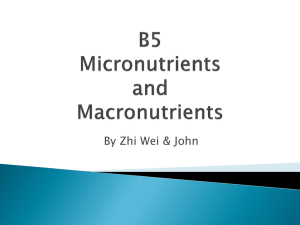Press release
advertisement
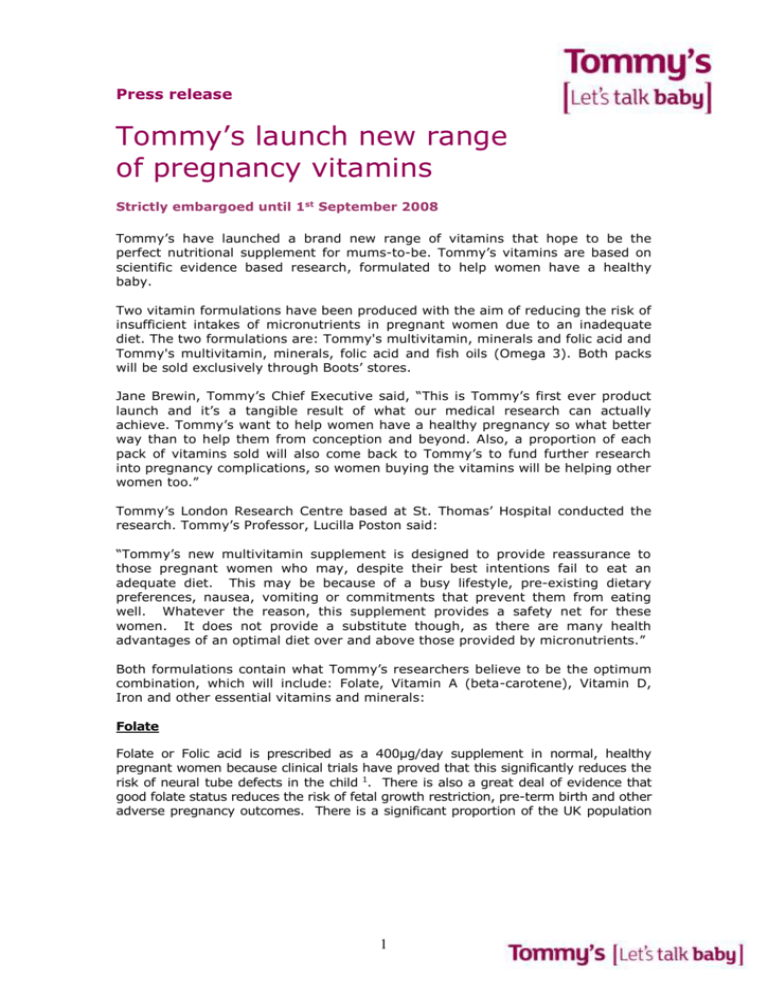
Press release Tommy’s launch new range of pregnancy vitamins Strictly embargoed until 1st September 2008 Tommy’s have launched a brand new range of vitamins that hope to be the perfect nutritional supplement for mums-to-be. Tommy’s vitamins are based on scientific evidence based research, formulated to help women have a healthy baby. Two vitamin formulations have been produced with the aim of reducing the risk of insufficient intakes of micronutrients in pregnant women due to an inadequate diet. The two formulations are: Tommy's multivitamin, minerals and folic acid and Tommy's multivitamin, minerals, folic acid and fish oils (Omega 3). Both packs will be sold exclusively through Boots’ stores. Jane Brewin, Tommy’s Chief Executive said, “This is Tommy’s first ever product launch and it’s a tangible result of what our medical research can actually achieve. Tommy’s want to help women have a healthy pregnancy so what better way than to help them from conception and beyond. Also, a proportion of each pack of vitamins sold will also come back to Tommy’s to fund further research into pregnancy complications, so women buying the vitamins will be helping other women too.” Tommy’s London Research Centre based at St. Thomas’ Hospital conducted the research. Tommy’s Professor, Lucilla Poston said: “Tommy’s new multivitamin supplement is designed to provide reassurance to those pregnant women who may, despite their best intentions fail to eat an adequate diet. This may be because of a busy lifestyle, pre-existing dietary preferences, nausea, vomiting or commitments that prevent them from eating well. Whatever the reason, this supplement provides a safety net for these women. It does not provide a substitute though, as there are many health advantages of an optimal diet over and above those provided by micronutrients.” Both formulations contain what Tommy’s researchers believe to be the optimum combination, which will include: Folate, Vitamin A (beta-carotene), Vitamin D, Iron and other essential vitamins and minerals: Folate Folate or Folic acid is prescribed as a 400µg/day supplement in normal, healthy pregnant women because clinical trials have proved that this significantly reduces the risk of neural tube defects in the child 1. There is also a great deal of evidence that good folate status reduces the risk of fetal growth restriction, pre-term birth and other adverse pregnancy outcomes. There is a significant proportion of the UK population 1 especially young women of reproductive age that consumes less than the recommended amount of folate. Vitamin A (Beta- Carotene) Vitamin A is very important for the development of the baby. However, vitamin A from animals in the form of retinol can cause severe mutations and pregnancy loss when consumed in very high doses during early pregnancy. Normally this is only found in women who have very high dietary intakes and who take a vitamin supplement containing retinol, as can be found in some vitamin supplements or cod liver oil. During pregnancy, however, it is advisable to give vitamin A in the plant-based form, called beta-carotene, as doing so improves vitamin A status without the risk of any harm to the baby. Vitamin D Vitamin D is unique amongst the vitamins in that its primary source is not from the consumption of food, but from sunlight. However, deficiencies occur from inadequate exposure to the sun which is very common for women in the UK due to the climate, while this may improve over the summer months for certain sections of the population, it may not for many especially those who remain covered up with clothing or spend most of their time indoors 2 .The primary purpose of vitamin D is to enhance intestinal absorption of calcium and so protect the mother’s own calcium stores from being depleted. Iron Whilst the intestinal absorption of minerals is often unregulated during pregnancy, many women do become anaemic due to iron deficiency and this can significantly affect pregnancy outcomes. It has been shown that for those with low iron status at the beginning of pregnancy, low-dose preventive supplementation from early in pregnancy is associated with better iron status and pregnancy outcomes than high dose iron supplementation in late pregnancy and is much better tolerated.3 Both formulations also contain some other essential vitamins and minerals. Notably, the second formulation contains Docosahexanoic Acid (DHA), which is a fish oil supplement. Professor Poston continued: “DHA may be particularly important during pregnancy as it is needed for neural development of the fetus and for the brain and retina. Although it can be manufactured from other fatty acids in the body, there is good evidence to suggest that this conversion process can struggle to produce sufficient amounts of DHA for optimal fetal development. Some supplementation trials have shown positive associations between DHA intake and visual acuity and cognitive abilities in early childhood.4 The Food Standards Agency (FSA) recommends that pregnant women consume at least one portion of oily fish per week during pregnancy. However, many women do not include oily fish in their normal diet and so may find this recommendation hard to follow. The amount of DHA in Tommy’s vitamins’ formulation (200mg per day) equates roughly to two 120g cans of sardines per week and therefore allows pregnant women to obtain the recommended amount of DHA without having to make unwanted changes to their diet. It also avoids any significant risk of 2 contamination from heavy metals such as mercury and arsenic, which has been suggested to present a risk to unborn babies and is the main reason why the FSA recommends not eating more than two portions of fish per week during pregnancy.” Tommy's multivitamin, minerals and folic acid retail at £3.99 for 30 tablets and Tommy's multivitamin, minerals, folic acid and fish oils (Omega 3) retail at £9.99 for 30 tablets both packs are on sale exclusively in Boots' stores and online at www.boots.com. For more information go to www.tommys.org ENDS References: (1) MRC Vitamin Study Research Group. Prevention of Neural Tube Defects: Results of the Medical Research Council Vitamin Study. Lancet 1991. 338:131–7. (2) Alfaham M, Woodhead S, Pask G, Davies D. Vitamin D deficiency: a concern in pregnant Asian women. Br J Nutr 1995;73:881–7 (3) Zhou SJ, Gibson RA, Crowther CA, Makrides M. Should we lower the dose of iron when treating anaemia in pregnancy? A randomized doseresponse trial. Eur J Clin Nutr. 2007 Oct 10 (4) Dunstan JA, Simmer K, Dixon G, Prescott SL. Cognitive assessment of children at age 21/2 years after maternal fish oil supplementation in pregnancy: a randomised controlled trial. Arch. Dis. Child. Fetal Neonatal Ed., January 1, 2008; 93(1): F45 - F50 NOTES TO EDITOR For further information about Tommy’s Vitamins or for interviews with spokespeople, please contact: Atia Islam Talukder atalukder@tommys.org or call Tommy’s Press Office on 020 7398 3440. Tommy’s [Let’s talk baby] From September 2008, Tommy’s, the baby charity will be known as Tommy’s [Let’s talk baby]. At Tommy’s we believe it is unacceptable that one in four women loses a baby every year. We want to give every baby the best chance of being born healthy, so we work to fund medical research into the causes of premature birth, stillbirth and miscarriage, and provide a free information service that educates all parents-to-be about health in pregnancy. Our information service is informed by our medical research and includes a telephone midwife service, a comprehensive website and free books and leaflets promoting health in pregnancy. By 2020 we want to halve the number of babies who die during pregnancy or birth. To talk to a Tommy’s midwife call 0870 777 30 60 or email midwife@tommys.org or log on to www.tommys.org 3
